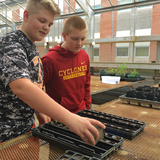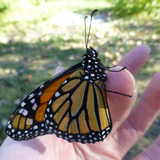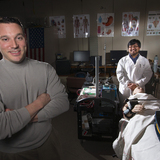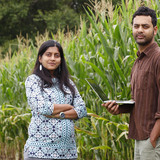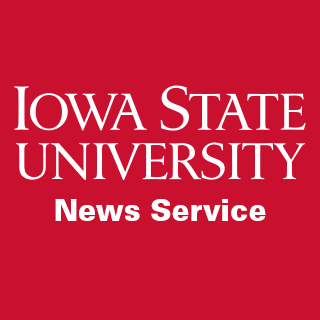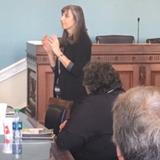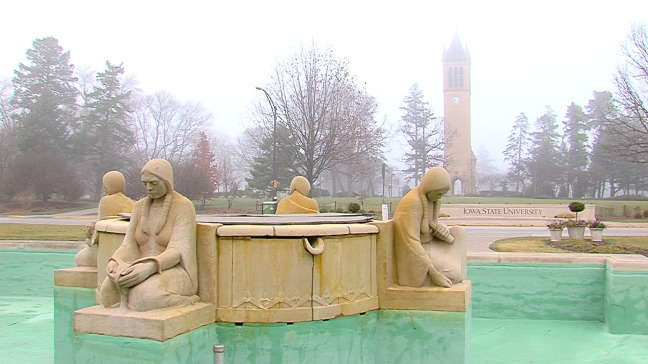News Archive
Tuesday, March 29 2016
-
Nearly 700 students to fill Hilton Coliseum with their science and tech research
The State Science and Technology Fair of Iowa returns to Iowa State's Hilton Coliseum on Thursday and Friday, March 31 and April 1. The public is invited to stop by and meet the next generation of scientists and engineers. Public viewing of high school projects is 2-6 p.m. on Thursday. Public viewing of junior high and award-winning high school projects is 9 a.m. to 6 p.m. on Friday. Admission is free.
-
Iowa State University researcher helps to forecast the chances of monarch butterfly survival
Monarch butterflies in North America may face quasi-extinction in the next 20 years unless something is done to expand their population capacity, according to an Iowa State University researcher. The eastern migratory monarch population declined 84 percent between 1996 and 2014.
-
Understanding ISIS, Middle East violence and what the resulting refugee crisis means for the U.S.
An Iowa State University expert in modern Middle Eastern history says the bombings in Brussels are yet another example of how ISIS is using violence to achieve a much broader objective. Michael Christopher Low says to appropriately respond to the terror threat, it is necessary to understand ISIS's goals and motivations, as well as the long-term impact of violence in the Middle East.
-
Expert will speak about aging without falling March 31 at Iowa State
Debbie Rose, an internationally recognized expert on balance and mobility in aging populations, will present "Preventing Falls in Older Adults" at 7 p.m. Thursday. March 31, in the Memorial Union Sun Room. Rose is ISU's Pease Family Scholar in Kinesiology, and co-directs the Fall Prevention Center of Excellence at Californial State University, Fullerton. Her talk is free and open to the public.
-
Iowa State’s ATHENA Lab dedicated to augmenting, understanding human performance
Iowa State's ATHENA Lab is full of sensors, tools and research equipment, including a full-sized mannequin for studies of suturing techniques. Richard Stone, Thomas Schnieders and a team of graduate students use the engineering lab to find ways to augment human performance. That includes developing better ways to train welders, design body armor or place UPC codes on packages.
-
Futurist Brian David Johnson will speak and host a town hall meeting at ISU March 29 and 30
The renowned futurist, technologist and author Brian David Johnson will bring his future-casting to Iowa State University for a talk on March 29 and a town hall meeting on March 30. His appearances are part of the university's National Affairs Series, and are free and open to the public. "Technology in 2025: Designing the Future" will be at 8 p.m. Tuesday, March 29, in the Great Hall of the Memorial Union. The town hall meeting "What's the Future of the American Dream?" will be at 7 p.m. Wednesday, March 30, in the Sun Room of the Memorial Union. The town hall meeting is part of a yearlong study of the future of the American dream timed to overlap with the 2016 presidential campaign.
-
Iowa State undergraduates showcase their research at annual Capitol event March 29
With research on wind turbine blade optimization, the underlying mechanisms of neuroinflammation, the Native American Jingle Dress and Iowa's care deserts, there will be much to discuss when 22 Iowa State University undergraduates present their research to legislators and others during the annual "Research in the Capitol." The event will be from 11 a.m. to 1 p.m. Tuesday, March 29, in the Rotunda of the State Capitol building in Des Moines. The University Honors Program coordinates the event.
-
Government use of technology has potential to increase food security
Acceptance of information technology can play a vital role in meeting the demand for food in developing countries, according to a new study by Iowa State University researchers. The research is published in the journal Information Technologies and International Development.
-
New Iowa State University research seeks to answer lingering questions on the leading cause of lameness in cattle
Recently published research from a team of ISU veterinarians takes a close look at the epidemiology of bovine digital dermatitis, revealing new information on how the disease develops and how likely it is to recur after treatment. The disease is the leading cause of lameness in cattle and has grown as a concern among beef producers in recent years.
-
Iowa State's graduate program in ag/biosystems engineering climbs to No. 2 in annual U.S. News ranking; other specialties also highly ranked
Iowa State’s agriculture and biosystems engineering program jumped another spot to No. 2 in U.S. News and World Report’s national graduate school rankings. Other highly ranked categories include veterinary medicine, statistics, aerospace engineering and industrial and manufacturing systems engineering.
-
New study: Human activity makes terrestrial biosphere contribute to climate change
Methane and nitrous oxide emissions that result from human activity make the terrestrial biosphere, which includes all land-based ecosystems, a net contributor of greenhouse gas emissions. Agricultural, waste management and other practices have driven the transformation of the terrestrial biosphere, according to new research.
-
Foreman named equal opportunity director
Margo Foreman, associate director of the Office of Equal Opportunity at Indiana University-Purdue University Indianapolis, will become Iowa State University's next director of equal opportunity. Foreman will start at Iowa State April 25.
-
Iowa State engineers develop flexible skin that traps radar waves, cloaks objects
Iowa State engineers have developed a "meta-skin" that uses liquid-metal technology to trap radar waves and cloak objects from detection. By stretching the flexible meta-skin, the device can be tuned to reduce the reflection of a wide range of radar frequencies. The journal Scientific Reports has just reported the discovery.
-
Studying interconnected communities of plants, microbes and other organisms in agriculture can unlock benefits for producers, consumers
A deeper understanding of phytobiomes, or the networks of interactions among the various components of an ecosystem, can unlock a vast range of benefits for farmers and consumers the world over. An Iowa State University researcher has helped to launch a new effort to emphasize phytobiomes in agriculture.
-
Media-driven attitudes about ‘Made in China’ label affect product and country
Consumers develop opinions about a product based on their experience with the item or the company. An Iowa State University researcher says those attitudes are also influenced by the media. Through a series of studies, Gang Han examined how news coverage dictates whether consumers have a positive or negative image of the product and the country where it's made.
